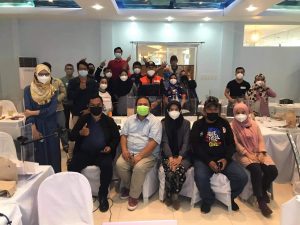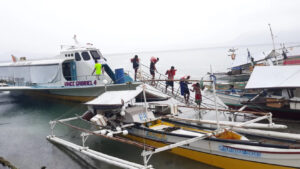In celebration of Earth Day, Catholic Relief Services (CRS) Philippines and the United States Agency for International Development (USAID), in collaboration with the Department of Environment and Natural Resources (DENR) and Korea International Cooperation Agency (KOICA) Philippines, hosted the Breakthrough Resilience: An Urban Climate Resilience Conference on April 24-25 in Manila, Philippines.
Today’s slow-onset climate change impacts and stresses on urban systems demand adaptive governance models that can respond effectively to evolving challenges. As cities become more dynamic, resilience becomes paramount to avoiding prolonged or irreversible outcomes of climate risks. “In such extraordinary times where weather patterns become so unpredictable, climate resilience efforts need to be innovative and holistic,” said Betty Chung, USAID Acting Mission Director. “USAID is actively supporting the Philippine government’s development agenda to accelerate climate action and disaster resilience.”
The conference brought together government officials, climate experts and representatives from development agencies, civil society, and the academic and private sectors to explore innovative solutions and breakthrough strategies for urban resilience against climate change impacts.
Over 200 participants attended the event, which served as a platform for collaboration on how to build networks and advocate for urban resilience and provided a space to share knowledge on the subject. Maria Concepcion Nobleza, CRS Philippines Head of Programming, emphasized the importance of collective action, stating, “Together, let us prioritize inclusive adaptation and resilience breakthroughs as central pillars of climate action.”
Yoo Ji Young, Deputy Country Director of KOICA, highlighted the importance of partnerships in resilience-building initiatives, “With USAID and CRS, KOICA was able to provide technical assistance enhancing the capacity of local government units (LGUs) to develop guidelines for and use climate adaptation technology.”
The conference sessions were divided into three themes: (1) Making Climate Data Accessible and Responsive, (2) Accelerating Urban Resilience Finance and (3) Nature-Based Solutions (NBS). Eleven urban resilience organizations participated as exhibitors, presenting their breakthrough results and knowledge products.
Analiza Teh, Undersecretary for Finance, Information Systems and Climate Change – Department of Environment and Natural Resources said, “Urban resilience transcends infrastructure and technology – it is about creating communities that are inclusive, equitable and sustainable. It is about empowering communities to be adaptable in the face of challenges such as climate change.”
The conference also featured the “Innovations for Resilience Challenge awards” in Day 2, recognizing cities with innovative projects contributing to climate and disaster resilience. The challenge, spearheaded by USAID and CRS Philippines, in partnership with the Philippine Disaster Resilience Foundation, awarded an initial fund of PHP 1 million (USD 17,530) to winning cities, along with knowledge-sharing sessions and mentorship opportunities.
Legazpi City Agriculture Office claimed the top spot, winning first prize for their proposal to organize a Sustainable Agriculture Summit. Zamboanga City secured two prizes. The second prize was awarded to Palec and Amigos Urban Environ Forestry Support Services for their plan to execute the Climate Resilient and Localized Urban Greening Program (CRLUGP); and the third prize went to the Zamboanga City Disaster Risk Reduction Office for their innovative “Salva Vida” fully integrated computer software system and mobile application (available on iOS & Android).
USAID Environment Director Ryder Rogers congratulated the winning cities, “Now these people-centered projects, projects that are owned, conceptualized and led by our partner cities, will be brought to life to address felt climate change impacts at the local level, as they will receive initial funding as part of their award.”
The Breakthrough Resilience Conference and the Innovations for Resilience Challenge are part of USAID’s five-year Climate Resilient Cities (CRC) project, which seeks to improve resilience by strengthening the capacities of cities to adapt to, mitigate, and manage the impacts of climate change.
Those who wish to view a recording of the conference can do so here.
Article by CRS Philippines



